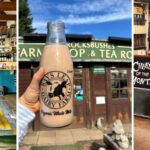- Work Hard
- 26th Dec 2020
- 1,052 Views
- 0
- 1 minutes
You’ll be glad we told you about this up-and-coming Geordie comedian, Lauren Pattison

We chat about the impacts of a rocky year, being a young woman in comedy, moving back to the North East, and why there’s no sense of humour like a Geordie sense of humour…










Comments